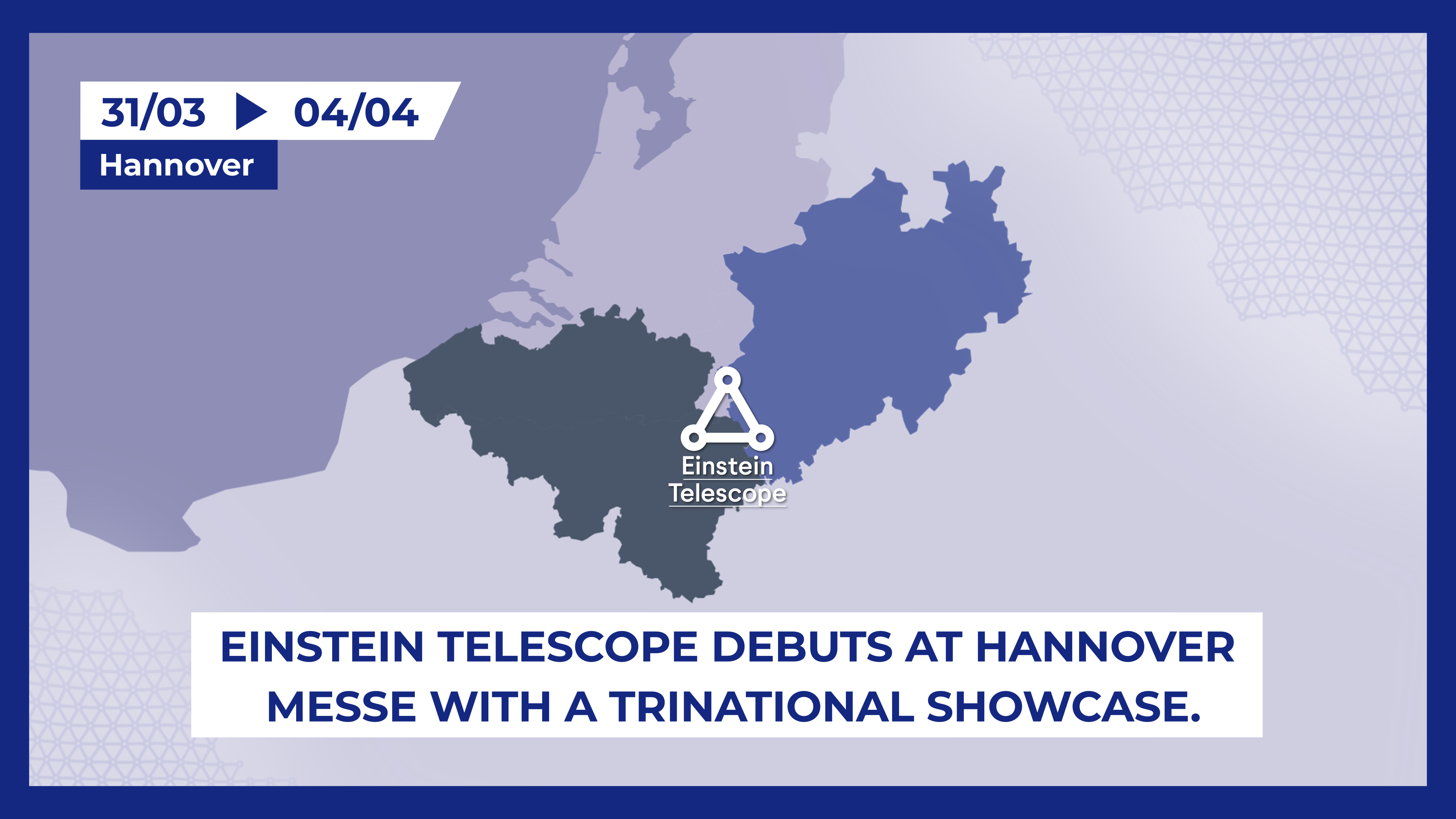Joint Einstein Telescope stand to showcase strengths and opportunities at Hannover Messe
March 28, 2025
A new exhibitor at the Hannover Messe trade and technology fair: the cutting-edge scientific observatory Einstein Telescope. At their joint stand, representatives from Belgium, Germany and the Netherlands will show their visitors how companies can already benefit now when they join the ecosystem to help realise this unique facility.
Governments in Belgium, Germany and the Netherlands are preparing a joint bid to host the Einstein Telescope. Underlining their strong cross-border collaboration, the three countries now present their first joint Einstein Telescope stand at the German Hannover Messe. We talk to their representatives about the importance of presenting the Einstein Telescope in Hannover, as scientific and industrial powerhouse Germany prepares its position on joining the Einstein Telescope.
Why is the Einstein Telescope showcasing at the Hannover Messe?
Matthias Grosch, business developer ET in North-Rhine Westphalia (NMWP): "The Hannover Messe is one of the world's largest innovation fairs. From 100,000 to 200,000 people come to see the latest developments, and meet representatives of industry, politics and science from across the world. We want to convince them of the value and opportunities in hosting this world-class Big Science project."
Ellen Tomesen, head of team science and education at the Dutch Embassy in Berlin: "This is an important phase in the decision making process for the Einstein Telescope. The strength of our bid lies in the unique geology of our border area, in our strong networks of top-tier science and industry, and in how well we work together across borders. Hannover Messe lets us showcase those strengths to exactly the right audience of industry and politicians."
What makes the Einstein Telescope interesting to high-tech companies?
Michel Stassart, ET project manager for Wallonia (GRE Liège): "For the next ten years, the Einstein Telescope is mostly an industrial project, not a scientific one. It is these high-tech companies that will get to design and build the technology for the Einstein Telescope, and evolve their own capabilities along the way. The technological requirements are like nothing ever done before: the Einstein Telescope will be ten times more sensitive than current detectors and will be able to observe 1000 times more events than its predecessors. "
Jorg van der Meij, program manager for the Dutch ET valorisation programme (LIOF): "Participating in the Einstein Telescope is both a challenge and a genuine opportunity for companies. They are not only interested in seeing their innovative products used in the observatory. The project also lets them improve their skills and capabilities, and gives access to networks involved in other exciting Big Science projects. It is also a mark of quality to have worked on this most sensitive instrument in the world. That makes it hugely attractive for present and future highly-qualified personnel."
Why is it important to get industry involved in the Einstein Telescope?
Maxime Corvilain, ET valorisation manager for Flanders (POM Limburg): "Our message to entrepreneurs is to be proactive and join the work on the Einstein Telescope now, because it takes years to develop the necessary technology to the right level. There are many opportunities to learn and help shape how the project reaches its extreme requirements. A strong industrial participation is also important for the strength of our tri-national bid and our ability to start construction quickly after the site selection in 2026-2027."
Michel Stassart: "Einstein Telescope's construction and development time of ten years or more may be unusual or even a bit scary for industry—they do take a risk when they decide to invest in developing these new technologies. But it is also an exciting opportunity for them, because those new technologies can give them a competitive advantage in their traditional markets and generate new business opportunities in new markets."
What will visitors get to experience at the Einstein Telescope stand?
Ellen Tomesen: "We look forward to talking with our visitors about the opportunities that the Einstein Telescope brings. There will be a lot to see and do; mock-ups of the vacuum test chamber ET-CRYSTAL and the Einstein Telescope itself, a VR experience of the underground facility, movies about gravitational waves, and subsurface rock samples from the drilling campaign in the border region.
"In addition we have a full programme with high-level representatives from Belgium, the Netherlands and North-Rhine Westphalia, as well as testimonials from our collaborators. Our programme is designed to generate a lot of visibility and interaction, not only to enthuse innovative companies, but with politicians who influence the German position on joining the Einstein Telescope project as well."
About the Einstein Telescope
The Einstein Telescope will be Europe's most advanced observatory for gravitational waves, studying colliding black holes and the earliest stages of our universe. Governments in Belgium, Germany and the Netherlands are preparing a joint bid to host this world-class facility. Their border area, the Euregio Meuse-Rhine, is ideal because of its quiet nature, stable subsurface and strong ecosystem of knowledge institutions and high-tech companies.
Visitors to the Hannover Messe can explore the Einstein Telescope project in the Euregio Meuse-Rhine at stand C15 in Hall 2, from 31 March to 4 April 2025.
Or contact your local business representative via https://www.einsteintelescope-emr.eu/en/

